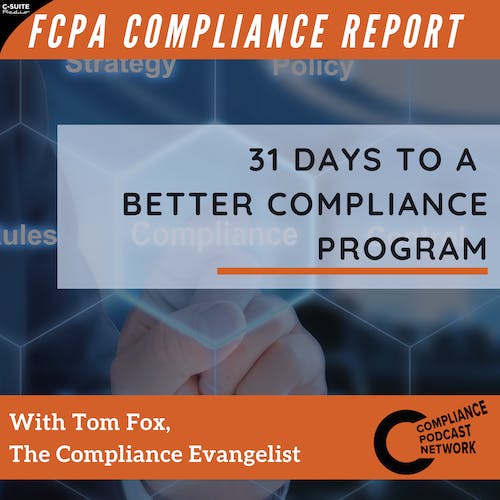Listen "Assessing internal controls in international operations"
Episode Synopsis
How should you assess your internal controls regime for international operations? It is incumbent that you need to review as much information as you can to understand the financial and operational structure of an entity and how it is integrated with the corporate headquarters, or the U.S. business unit’s financial and operation structure, if the foreign operation is part of a U.S. business unit.
You could begin with the TI-CPI to garner a sense of the reputation of the country in which your business unit is located, as well as the CPI for all other countries in which the location either markets business or has current customers. Another area for inquiry or review is the scope of your foreign operations. This means you will need to consider your sales model, whether employee based or primarily using third party representatives. You will also need to consider if such third-party representatives are coming into a commercial relationship with your company through your supply chain.
Other areas of inquiry should include whether your company’s finance and accounting staff produce financial statements that are integrated into the parent’s financial statements; whether your international business locations utilize a local bank account for local sales receipts as well as funds transfers from the U.S. and whether the account has local check signers and whether dual signatures are required on the checks. You may also want to consider the extent to which disbursements are made in the local currency and, of course, is there a local petty cash fund.
Three key takeaways:
You must understand the financial and operational structure of your company and how that structure outside the U.S. is integrated with the corporate headquarters.
Are your financial statements and reporting systems integrated?
Always consider the fraud triangle.
Learn more about your ad choices. Visit megaphone.fm/adchoices
You could begin with the TI-CPI to garner a sense of the reputation of the country in which your business unit is located, as well as the CPI for all other countries in which the location either markets business or has current customers. Another area for inquiry or review is the scope of your foreign operations. This means you will need to consider your sales model, whether employee based or primarily using third party representatives. You will also need to consider if such third-party representatives are coming into a commercial relationship with your company through your supply chain.
Other areas of inquiry should include whether your company’s finance and accounting staff produce financial statements that are integrated into the parent’s financial statements; whether your international business locations utilize a local bank account for local sales receipts as well as funds transfers from the U.S. and whether the account has local check signers and whether dual signatures are required on the checks. You may also want to consider the extent to which disbursements are made in the local currency and, of course, is there a local petty cash fund.
Three key takeaways:
You must understand the financial and operational structure of your company and how that structure outside the U.S. is integrated with the corporate headquarters.
Are your financial statements and reporting systems integrated?
Always consider the fraud triangle.
Learn more about your ad choices. Visit megaphone.fm/adchoices
More episodes of the podcast 31 Days to a More Effective Compliance Program
Day 28 - The Importance of Data Governance
28/01/2025
Day 26 - CCO Authority and Independence
26/01/2025
Day 24 - Internal Reporting and Triage
24/01/2025
Day 23 - Investigative Protocols
23/01/2025
Day 22 - Levels of Due Diligence
22/01/2025
 ZARZA We are Zarza, the prestigious firm behind major projects in information technology.
ZARZA We are Zarza, the prestigious firm behind major projects in information technology.
